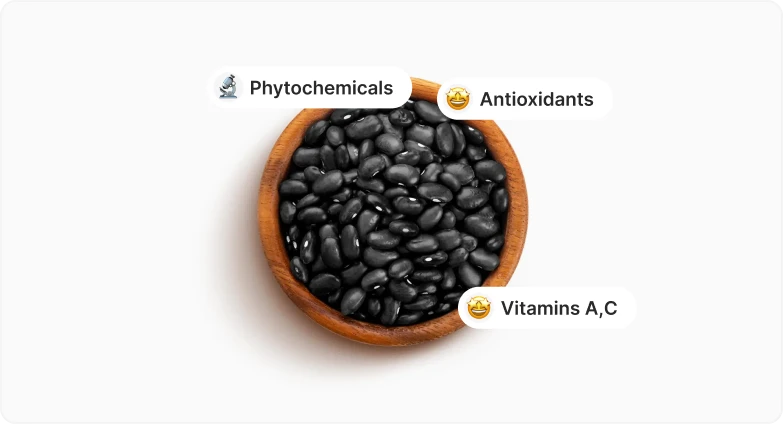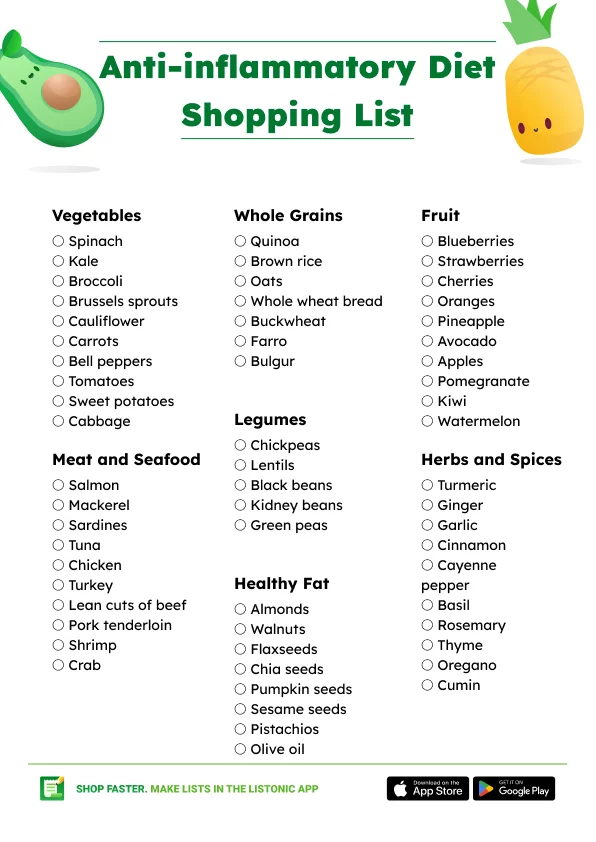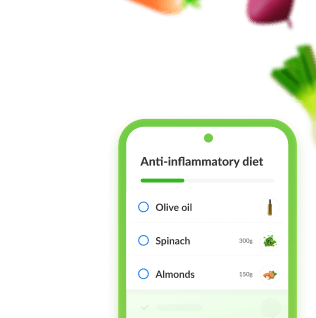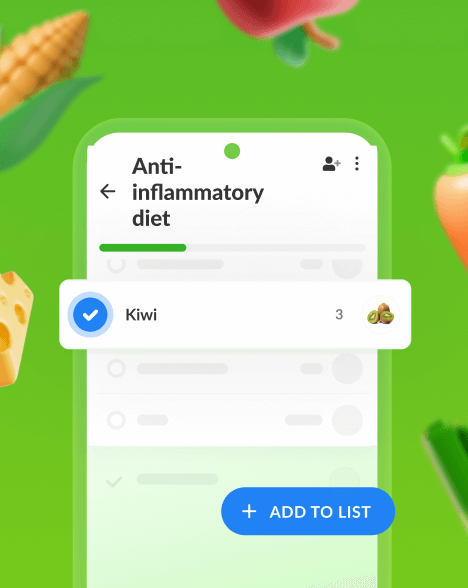Privacy Policy | Terms of services | Consent choices | © 2006-2024 Listonic. All rights reserved. Listonic Dev, and Listonic Ads are part of Listonic.
Anti-inflammatory Diet Food List (+ Shopping List and PDF)
July 5, 2023
By following an anti-inflammatory diet, people can reduce inflammation and promote overall health and well-being. Let’s delve into the key principles that make this diet so effective – an emphasis on antioxidant-rich fruits and vegetables, anti-inflammatory spices, and omega-3 fatty acids. Additionally, we have a carefully planned shopping list for you to ensure you have all the essential ingredients to embark on this transformative journey.
Table of contents
Anti-inflammatory Diet Shopping List
Anti-inflammatory Diet Guidelines
Anti-inflammatory Diet Food List Breakdown
What Else to Keep in Mind?
Conclusions
Anti-inflammatory Diet Shopping List
Anti-inflammatory Diet Guidelines
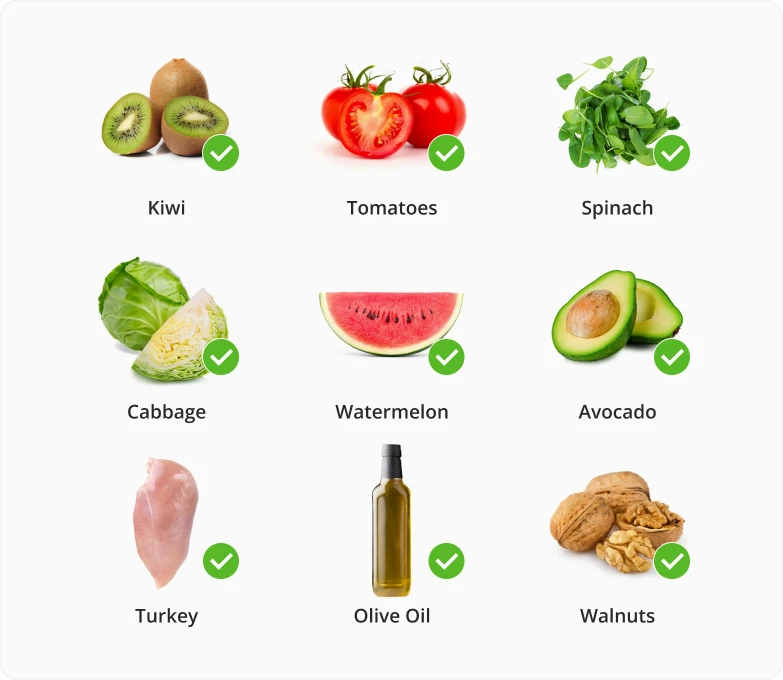
In order to successfully follow an anti-inflammatory diet plan, you must learn certain key rules.
Firstly, you should focus on consuming unprocessed whole foods that are high in nutrients and antioxidants. Hence, it is important to include a wide range of vibrant fruits and vegetables into your meals, together with healthy fats and proteins.
You are also encouraged to limit the consumption of processed foods, refined sugars, and unhealthy fats. You should also be aware of any potential food sensitivities and avoid products that may personally cause an allergic response. Among the most common food allergens you can find gluten, dairy, and certain nightshade vegetables such as tomatoes, peppers, and eggplant. By identifying and avoiding trigger foods, you can effectively reduce the risk of inflammation.
By following these guidelines and customising them to suit your individual needs, you can embrace the anti-inflammatory diet, improve your overall health, and increase vitality.
Anti-inflammatory Diet Food List Breakdown
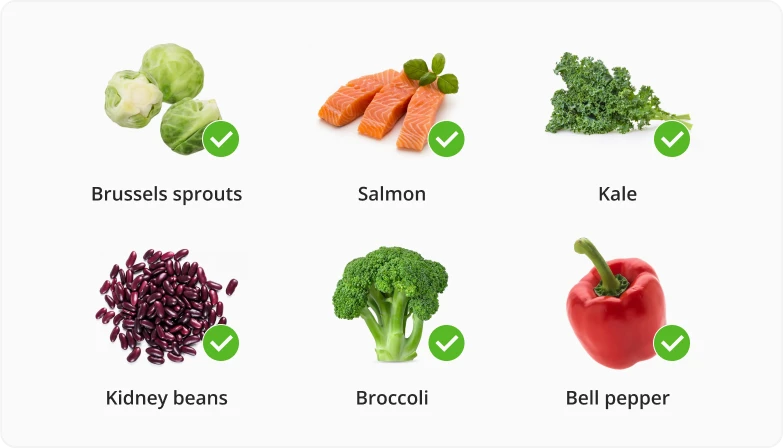
Fruit
Including them in your diet is crucial because they are loaded with antioxidants, vitamins, and fiber. Berries like blueberries, strawberries, and cherries contain anthocyanins, which possess powerful anti-inflammatory properties. Oranges and pineapple are excellent sources of vitamin C – an antioxidant that prevents inflammation. Avocado, on the other hand, is rich in monounsaturated fats and supports a healthy inflammatory response within the body.
Whole Grains
They are packed with essential nutrients (such as fiber, vitamins, minerals, and antioxidants) that are vital for optimal health and well-being. In comparison to refined grains found in processed foods (such as white flour products or sugar-laden cereals), their glycemic index is much lower, which allows for a better regulation of blood sugar levels and decreased inflammation.
The consumption of whole grains makes you feel more full and satisfied after a meal. These products support your gut health and bowel movements, as well.
You should include, for example, whole wheat bread into your daily meal plan in order to secure stable energy levels and promote healthy inflammatory response in your organism.
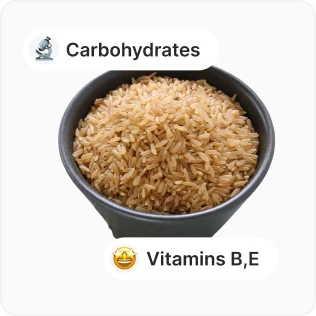
Vegetables
They are the mainstay of an anti-inflammatory diet. Leafy greens (such as spinach and kale) are exceptionally rich in vitamins, minerals, and phytochemicals that have remarkable anti-inflammatory properties. Similarly, broccoli and Brussels sprouts contain a valuable substance called sulforaphane, renowned for its potent anti-inflammatory and antioxidant qualities. Additionally, colourful vegetables like bell peppers and tomatoes are abundant sources of vitamin C and other antioxidants that boost your immune system.
Legumes
Pulses such as chickpeas, lentils, and black beans are filled with fiber, plant-based protein, and an assortment of nutrients. Incorporating them into your diet can help to decrease inflammation by providing a combination of carbohydrates and fibre, while maintaining a low glycemic index.
Additionally, legumes contain phytochemicals that possess anti-inflammatory properties and support cardiovascular health.
Healthy Fats
A well-balanced diet calls for the inclusion of healthy fats. Nuts and seeds such as almonds, walnuts, flaxseeds, and chia seeds are rich in omega-3 fatty acids, which possess powerful anti-inflammatory properties. Additionally, they offer fiber, protein, and a range of essential vitamins and minerals. Similarly, olive oil is high in monounsaturated fats and antioxidants, which show anti-inflammatory effects.
Meat and Seafood
When following an anti-inflammatory diet, you are allowed to consume specific types of meat. Lean cuts of chicken, turkey, and beef offer high-quality protein without the excessive levels of saturated fats found in fattier cuts. Moreover, these options contain important amino acids that contribute to muscle health.
Seafood choices such as salmon, mackerel, and sardines have significant levels of omega-3 fatty acids known for their anti-inflammatory properties. These fatty fishes provide a range of essential nutrients including protein, vitamins, and minerals, as well.
Herbs and Spices
In this dietary approach, the role of inflammation-fighting spices is crucial. Turmeric, for example, contains a compound called curcumin that shows anti-inflammatory and antioxidant properties. Similar qualities can be found in ginger, cumin and garlic.
Additionally, cinnamon supports the regulation of blood sugar levels, while Cayenne pepper contains capsaicin, a substance that reduces inflammation.
Herbs like basil, rosemary, thyme, and oregano are also rich in antioxidants and anti-inflammatory compounds.
Get a Anti-inflammatory Diet Grocery List on Your Phone!
Add & remove items
Sort items by store aisles
Share the list with your partner

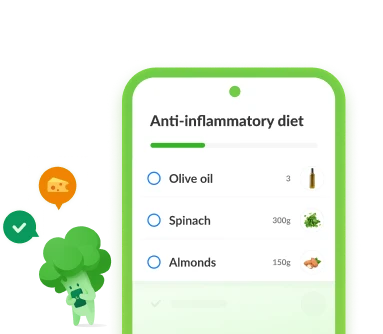
What Else to Keep in Mind?
What Foods to Avoid?
When following an anti-inflammatory diet, you should steer clear of foods that can trigger inflammation in your body.
Processed and refined foods: They often contain unhealthy fats, refined sugars, and additives that can cause inflammation. For this reason, you should avoid packaged snacks, fast food, sugary beverages, and processed meats.
Refined grains: White bread, white rice, and refined cereals lack key nutrients and can cause spikes in blood sugar levels, potentially promoting inflammation. Choose whole grains instead.
Added sugars: Foods and beverages high in added sugars, such as sodas, sweets, pastries, and sugary cereals, can contribute to chronic inflammation. Opt for natural sweeteners like honey or choose fruits as a healthier alternative.
Trans fats: They can be found in processed snacks, baked goods, and fried products. Unhealthy fats increase inflammation and pose a risk of chronic diseases. Read food labels carefully and avoid products containing partially hydrogenated oils.
Red meat: Limit the consumption of red meat because excessive it has been linked to increased inflammation and certain chronic illnesses. Choose lean cuts and balance your red meat consumption with other protein sources such as fish, poultry, and legumes.
Excessive alcohol: Heavy alcohol consumption triggers inflammation and harms various organs.
Who Should Follow an Anti-inflammatory Diet?
The anti-inflammatory diet is beneficial for all people looking for a way to improve their health and effectively address specific health problems:
People suffering from chronic inflammation: Individuals with chronic inflammatory diseases such as rheumatoid arthritis, inflammatory bowel disease (IBD), or chronic pain conditions might discover that incorporating an anti-inflammatory diet into their routine alleviates symptoms and reduces inflammation.
Patients with autoimmune diseases: One of the main symptoms of autoimmune diseases is the presence of chronic inflammation. To address this problem effectively, people diagnosed with lupus, multiple sclerosis, or Hashimoto's thyroiditis should consider following an anti-inflammatory diet.
People at risk of chronic diseases: Various chronic diseases, such as heart disease, diabetes, and certain cancers, share a common factor of chronic inflammation. By adopting an anti-inflammatory diet, you can reduce their risk of developing these conditions.
People seeking weight management: Obesity and excessive body fat has been linked to chronic inflammation. In order to combat this issue effectively, you should focus on consuming whole, nutrient-dense foods. By doing so, you can support your weight management goals while potentially reducing inflammation associated with excessive body weight.
People who want to support their overall health: An anti-inflammatory diet offers numerous benefits, even for individuals who do not have any specific health conditions. It promotes optimal nutrition, aids in maintaining a healthy weight, boosts cardiovascular health, improves cognitive function, and contributes to general well-being.
Conclusions
The anti-inflammatory diet is a dietary approach that can significantly improve your health and wellness. By prioritizing whole foods and avoiding inflammatory triggers like processed snacks and excessive alcohol consumption, you can effectively combat inflammation in your organism. To assist you on your journey towards better health, we have included a comprehensive shopping list that will help you make conscious decisions as an informed customer. Feel free to use it.
